2020年高中英语(人教版 选修7)教师用书:Unit 2 Section_Ⅲ Learning_a
高中英语 新课标人教版选修7unit 2篇章2阅读课课件 (共16张ppt)
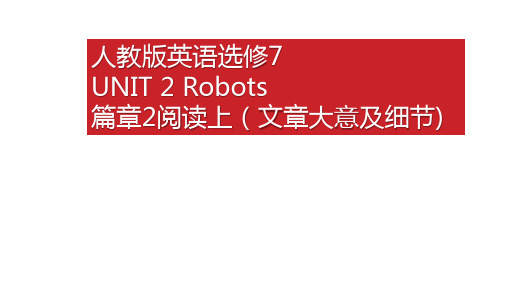
1948 Got PhD in chemistry.
Reading
1949
Became a biochemistry teacher, Boston University School of Medicine.
1950
19511953
Published his first novel. Published “I, Robot” Developed three laws for robots.
Paragraph 3. His education and occupation Paragraph 4. How he started his writing career Paragraph 5. His major achievements and influence
Paragraph 6. His personal life
Example: I think he is a prolific writer because it is mentioned in the text that he wrote around 480 books, which is a lot!
Reading & Thinking
Some possible answers
1983 Had a blood transfusion. Became infected with HIV.
1992 Died in New York
Reading & Thinking
1. Does this biography follow time order? Why or why not? 2. Why is Asimov’s marriage mentioned last in the text?
人教版高中英语选修7Unit2教案2

Unit 2 RobotsPart 1 Teaching Design 第一部分教学设计Period 2 A sample lesson plan for Learning about Language(Revise the passive voice including the infinitive)IntroductionIn this period students will be first helped by the teacher to discover and learn to use some useful words and collocations, and then to discover and revise the passive voice including the infinitive. The following steps of teaching may be taken: warming up by having a dictation, discovering useful words and collocations, reading more about the 22nd century, learning about the passive voice, discovering useful structures and closing down by putting on stage a text play of Satisfaction Guaranteed.ObjectivesTo help students revise the passive voiceTo help students discover and learn to use some useful words and collocationsTo help students discover and learn to use some useful structuresProcedures1. Warming up by having a dictationTo begin with, let’s take a dictation to strengthen our memory of the text.Larry Belmont worked for a company that make robot. Recently a robot that could do housework would be tested out Larry's life, Clair, for three weeks. Clair felt alarmed by the robot's humanly appearance. Before long she began to trust him. She told him that she and her home were not elegant enough for her husband and she envied the rich and powerful woman .The robot decided to protect her from being harm. He gave her a new haircut and changed her makeup and asked her to buy something to decorate her home. Before the night he was to leave Clair, they held a party. The guests were impressed by Clair and her home, especially by the handsome robot, whom they thought was her husband. Claire knew this is almost a dream and she felt very sad. However, the company was very satisfied with Tony, the robot although he needed rebuilding because it is absurd to have women falling in love with a machine.2. Discovering useful words and collocationsA collocation is two or more words that often go together. These combinations just sound "right" to native English speakers, who use them all the time.While going over the text, try to recognize the collocations, treat them as single blocks of language and copy them out into your Collocation Book.Now go to page 13. Work in pairs to finish the three exercises in 10 minutes.3. Learning about the passive voiceACTIVE AND PASSIVE TENSES CHARTSIMPLE PRESENT and SIMPLE PASTThe active object becomes the passive subject.am/is/are +past participlewas/were + past participleActive: Simple PresentThe movie fascinates me.The movie bores Jack.The movie surprises them.Passive: Simple PresentI am fascinated by the movie.Jack is bored by the movie.They are surprised by the movie.Active: Simple PastThe movie bored me.The movie fascinated Jack.The movie surprised them.Passive: Simple PastI was bored by the movie.Jack was fascinated by the movie.They were surprised by the movie.PRESENT and PAST CONTINUOUS (PROGRESSIVE) Passive form:am/is/are + being + past participlewas/were + being + past participleActive: Present ContinuousI am helping Shannon.June is helping Su and Ling.Passive: Present ContinuousShannon is being helped by me.Su and Ling are being helped by June.Active: Past ContinuousI was cleaning the bathroom.They were cleaning the bedroom.Susan was cleaning the kitchen and patio.Passive: Past ContinuousThe bathroom was being cleaned by me.The bedroom was being cleaned by them.The kitchen and patio were being cleaned by Susan.PRESENT PERFECT, PAST PERFECT and FUTURE PERFECT Passive form:have/has been + past participlehad been + past participleActive: Present PerfectI have mailed the gift.Jack has mailed the gifts.Passive: Present PerfectThe gift has been mailed by me.The gifts have been mailed by Jack.Active: Past PerfectSteven Spielberg had directed the movie.Penny Marshall had directed those movies.Passive: Past PerfectThe movie had been directed by Steven Spielberg. The movies had been directed by Penny Marshall.Active: Future PerfectJohn will have finished the project next month.They will have finished the projects before then.Passive: Future PerfectThe project will have been finished by next month. The projects will have been finished before then.FUTURE TENSESPassive forms: will + be + past participleis/are going to be + past participleActive: Future with WILLI will mail the gift.Jack will mail the gifts.Passive: Future with WILLThe gift will be mailed by me.The gifts will be mailed by Jack.Active: Future with GOING TOI am going to make the cake.Sue is going to make two cakes.Passive: Future with GOING TOThe cake is going to be made by me.Two cakes are going to be made by Sue.PRESENT / FUTURE MODALSThe passive form follows this pattern:modal + be + past participleActive: WILL / WON'T (WILL NOT)Sharon will invite Tom to the party.Sharon won't invite Jeff to the party. (Sharon will not invite Jeff to the party.)Passive: WILL / WON'T (WILL NOT)Tom will be invited to the party by Sharon. Jeff won't be invited to the party by Sharon. (Jeff will not be invited to the party by Sharon.)Active: CAN / CAN'T (CAN NOT)Mai can foretell the future.Terry can't foretell the future.(Terry can not foretell the future.)Passive: CAN / CAN'T (CAN NOT)The future can be foretold by Mai.The future can't be foretold by Terry.(The future can not be foretold by Terry.)Active: MAY / MAY NOTHer company may give Katya a new office. The lazy students may not do the homework.MIGHT / MIGHT NOTHer company might give Katya a new office.The lazy students might not do the homework.Passive: MAY / MAY NOTKatya may be given a new office by her company.The homework may not be done by the lazy students. MIGHT / MIGHT NOTKatya might be given a new office by her company. The homework might not be done by the lazy students.Active: SHOULD / SHOULDN'TStudents should memorize English verbs.Children shouldn't smoke cigarettes.Passive: SHOULD / SHOULDN'TEnglish verbs should be memorized by students. Cigarettes shouldn't be smoked by children.Active: OUGHT TOStudents ought to learn English verbs.(negative ought to is rarely used)Passive: OUGHT TOEnglish verbs ought to be memorized by students.Active: HAD BETTER / HAD BETTER NOTStudents had better practice English every day. Children had better not drink whiskey.Passive: HAD BETTER / HAD BETTER NOTEnglish had better be practiced every day by students. Whiskey had better not be drunk by children.Active: MUST / MUST NOTTourists must apply for a passport to travel abroad. Customers must not use that door.Passive: MUST / MUST NOTA passport to travel abroad must be applied for.That door must not be used by customers.Active: HAS TO / HAVE TOShe has to practice English every day.Sara and Miho have to wash the dishes every day. DOESN'T HAVE TO/ DON'T HAVE TOMaria doesn't have to clean her bedroom every day.The children don't have to clean their bedrooms every day.Passive: HAS TO / HAVE TOEnglish has to be practiced every day.The dishes have to be washed by them every day. DOESN'T HAVE TO/ DON'T HAVE TOHer bedroom doesn't have to be cleaned every day. Their bedrooms don't have to be cleaned every day.Active: BE SUPPOSED TOI am supposed to type the composition.I am not supposed to copy the stories in the book.Janet is supposed to clean the living room.She isn't supposed to eat candy and gum.They are supposed to make dinner for the family.They aren't supposed to make dessert.Passive: BE SUPPOSED TOThe composition is supposed to be typed by me.The stories in the book are not supposed to be copied. The living room is supposed to be cleaned by Janet. Candy and gum aren't supposed to be eaten by her. Dinner for the family is supposed to be made by them. Dessert isn't supposed to be made by them.PAST MODALSThe past passive form follows this pattern:modal + have been + past participleActive: SHOULD HAVE / SHOULDN'T HAVEThe students should have learned the verbs.The children shouldn't have broken the window.Passive: SHOULD HAVE / SHOULDN'T HAVEThe verbs should have been learned by the students. The window shouldn't have been broken by the children.Active: OUGHT TOStudents ought to have learned the verbs. (negative ought to is rarely used)Passive: OUGHT TOThe verbs ought to have been learned by the students.Active: BE SUPPOSED TO (past time)I was supposed to type the composition.I wasn't supposed to copy the story in the book.Janet was supposed to clean the living room.She wasn't supposed to eat candy and gum.Frank and Jane were supposed to make dinner.They weren't supposed to make dessert.Passive: BE SUPPOSED TO (past time)The composition was supposed to be typed by me. The story in the book wasn't supposed to be copied. The living room was supposed to be cleaned by Janet. Candy and gum weren't supposed to be eaten by her. Dinner was supposed to be made by them.Dessert wasn't supposed to be made by them.Active: MAY / MAY NOTThat firm may have offered Katya a new job.The students may not have written the paper.MIGHT / MIGHT NOTThat firm might have offered Katya a new job.The students might not have written the paper.Passive: MAY / MAY NOTKatya may have been offered a new job by that firm. The paper may not have been written by the students. MIGHT / MIGHT NOTKatya might have been offered a new job by that firm.The paper might not have been written by the students.4. 被动语态小结●被动语态的特殊结构形式1)带情态动词的被动结构。
2020-2021学年人教版英语选修7教师用书:Unit 2 Section Ⅰ Warming
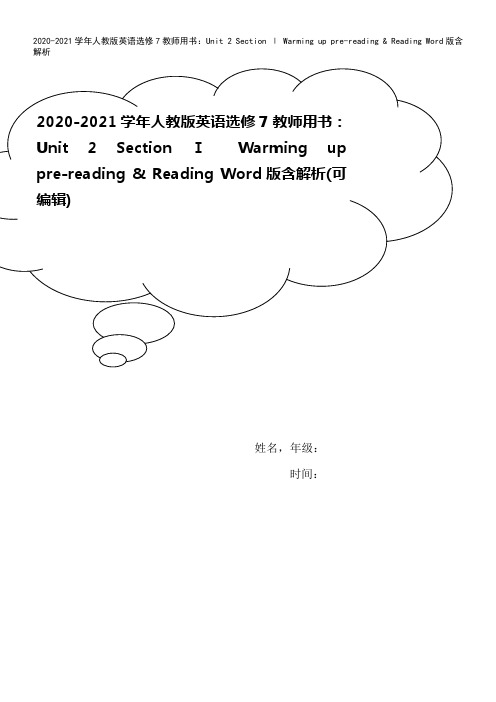
姓名,年级:时间:科学家发明了一套机器人手臂,可以做饭。
此外,它们可以洗碗,也可以发现潜在的危险,如火灾。
多么棒的发明!British scientists have invented a set of robotic arms。
They can cook meals for you.The price of the device is about £ 10,000. It includes an oven,a hob,a dishwasher and a sink.Scientists spent almost 18 years developing the hands. Each hand is governed by 24 motors, 26 micro.controllers and 129 sensors。
The arms can chop and stir to recreate almost anything you would like to eat. The food may be a simple home。
cooked supper, or a wonderful dinner designed by a world class chef。
The hands move a little slowly. Whenever they aren't busy, they may hang strangely above the work surface. They can imitate human movements such as wiping a spoon on the edge of a pan to prevent drips。
The arms will tuck up when not in use,making space for their owners.People can train the robotic arms to cook their favorite family recipes by showing them a few times while wearing high。
人教版高中英语选修7Unit2教案1
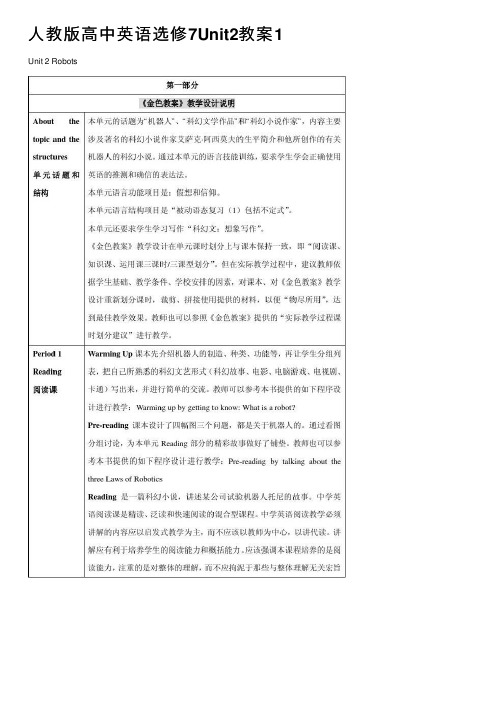
⼈教版⾼中英语选修7Unit2教案1 Unit 2 RobotsPart 1 Teaching Design第⼀部分教学设计Period 1 A sample lesson plan for reading(Satisfaction Guaranteed) IntroductionIn this period, after the warming up, students will first be guided to read for forms, copy collocations and write articles. Then they shall question and answer, read the text again to discover the leading sentence of each paragraph, and read the text for its type of writing and summary of Satisfaction Guaranteed. The class is to end by students reading a robot poem.ObjectivesTo help students understand the text’s forms and contents and learn about robotsTo help students communicate on the topic in focus with the words, collocations and structures learned in this unitFocusAidsMultimedia facilities, tape-recorder, photos, diagrams Procedures1. Warming up by getting to know w hat a robot isHello, class. When you hear the word "robot", you probably get a picture in your mind of a clever mechanical man, perhaps R2D2 or C3PO from the movie Star Wars. That is how most people think of robots, but the robots that really exist today are quite different from the robots of comic books, cartoons, and science fiction films and books.Robots come in many shape and sizes and have many different abilities. Basically, a robot is simply a computer with some sort of mechanical body designed to do a particular job. Usually, it is able to move and has one or more electronic senses. These senses are not nearly as powerful as our own senses of sight and hearing. However, scientists and engineers are working hard to improve robots. They are constantly coming up with ways to make them see, hear and respond to the environment around them.Robots have a lot to do with our lives. Now let’s go to page 11 to read an article about robot s and our lives.2. Pre-reading by talking about the three Laws of RoboticsRobots are coming into our lives. Then we are worried about being controlled by robots some day in the future. Don’t worry. We have rules for robots.3. Reading for formsRead the text Satisfaction Guaranteed again to: cut/ the sentence into thought groups, blacken the predicates, darken the connectives and underline all the useful collocations.4. Copying collocations and writing articlesA collocation is two or more words that often go together. These combinations just sound "right" to native English speakers, who use them all the time.While going over the text, try to recognize the collocations, treat them as single blocks of language and copy them out into your Collocation Book.5. Questioning and answeringNow let’s go over the text again by questioning and answering. Satisfaction GuaranteedA: What did Larry Belmont work for?B: Larry Belmont worked for a company that made robots.A: What was the company experimenting with recently?B: Recently it was experimenting with a robot that could be used todo the housework.A: By whom was it going to be tested out?B:It was going to be tested out by Larry’s wife, Claire.A:Why didn’t Claire want the robot in her house?B:Claire didn’t want the robot in her house, especially as her husbandwould be absent for three weeksA: How did Claire feel when she first saw the robot?B: When she first saw the robot, she felt alarmed.A: What was the robot like?B:The robot, called Tony, didn’t look like a machine at all. He was tall and handsome although his facial expressions never changed. His hair was smooth and black and his voice was deep.A: What did the robot do the second morning?B: On the second morning Tony brought her breakfast and then asked her whether she needed help dressing.A: How did Claire react?B:She felt embarrassed and quickly told him to go. It was disturbing and frightening that he looked so human.A: What did Claire mention one day?B:One day, Claire mentioned that she didn’t think she was clever.A: And what did Tony, the robot, say to her?B: Tony said that she must feel very unhappy to say that.A:How did Claire feel about a robot’s sympathy?B: Claire thought it was ridiculous to be offered sympathy by a robot.…6. Reading the text again to discover the topic sentence of each paragraphA well-organized paragraph supports or develops a single controlling idea, which is expressed in a sentence called the topic sentence. A topic sentence has several important functions: it substantiates or supports an essay’s thesis statement; it unifies the content of a paragraph and directs the order of the sentences; and it advises the reader of the subject to be discussed and how the paragraph will discuss it. Now read the text again to discover the leading sentence of each paragraph.7. Reading the text for its type of writing and summary of Satisfaction GuaranteedThere are words that signal a text's organizational structure. If you are struggling with how to make sense of what you're reading, you must increase your sensitivity to the particular word s.Determining the type of writing will help you determine the author’s topic (subject), purpose (why he is writing), style (how he should write) and tone (his attitude toward his subject - supportive, condeming, objective, etc.)It is important to find main ideas when reading. Main ideas help you remember important information. The main idea of a paragraph tells the topic of the paragraph. The topic tells what all or most of the sentences are about. The other sentences in the paragraph are called details. Details describe or explain the main idea. Read the text to find the main idea.Now go over the text for its type of writing and summary of Satisfaction Guaranteed.Type of writing A narrationMain idea of 1st paragraph A robot that could be used to do the housework was going to betested out by Larry’s wife, Claire.Main idea of 2nd paragraph The robot, called Tony, was tall and handsome, his hair beingsmooth and black and his voice being deep.Main idea of 3rd paragraph Tony was disturbing and frightening to Claire that he looked sohuman.Main idea of 4th paragraph Claire began to trust Tony.Main idea of 5th paragraph Claire was amazed by Tonny’s fingernails and the softness andwarmth of his skin.Main idea of 6th paragraph Claire thanked Tony, telling him that he was a ―dear’.Main idea of 7th paragraph Tony suggested that Claire invite Gladys and her friends to the house.Main idea of 8th paragraph Tony held Claire firmly in his arms and she felt the warmth of his body.Main idea of 9th paragraph Tony folded his arms around Claire, bending his face close to hers.Main idea of 10th paragraph Claire heard Cladys whispering to another woman that she had never seen anyone so handsome as Tony.Main idea of 11th paragraph The next morning a car drove up and took Tony away.Main idea of 12th paragraph Even though Tony had been so clever, he would have to be rebuilt—you cannot have women falling in love with machines.8. Closing down by reading a robot poemMy Robot Does My HomeworkMy robot does my homework.He helps me every night.The trouble is he doesn't gettoo many answers right.He'd probably do betterat homework but, you see,I built him, so he only knowsthe things he learned from me.--Kenn Nesbitt。
人教版高中英语选修7教师用书:U...
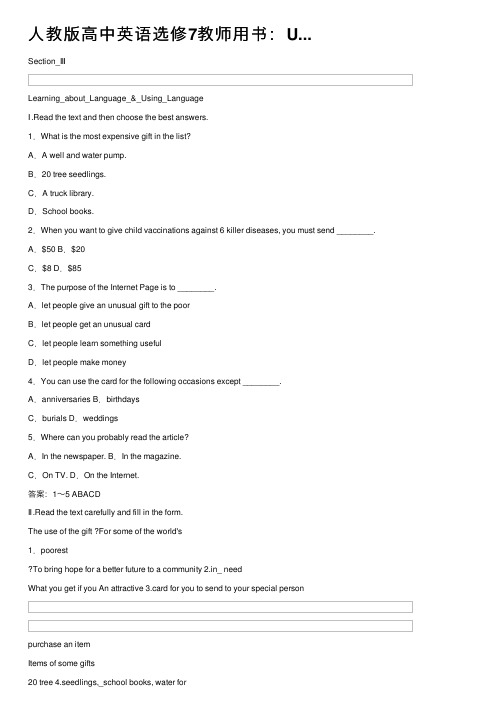
⼈教版⾼中英语选修7教师⽤书:U...Section_ⅢLearning_about_Language_&_Using_LanguageⅠ.Read the text and then choose the best answers.1.What is the most expensive gift in the list?A.A well and water pump.B.20 tree seedlings.C.A truck library.D.School books.2.When you want to give child vaccinations against 6 killer diseases, you must send ________. A.$50 B.$20C.$8 D.$853.The purpose of the Internet Page is to ________.A.let people give an unusual gift to the poorB.let people get an unusual cardC.let people learn something usefulD.let people make money4.You can use the card for the following occasions except ________.A.anniversaries B.birthdaysC.burials D.weddings5.Where can you probably read the article?A.In the newspaper. B.In the magazine.C.On TV. D.On the Internet.答案:1~5 ABACDⅡ.Read the text carefully and fill in the form.The use of the gift ?For some of the world's1.poorestTo bring hope for a better future to a community 2.in_ needWhat you get if you An attractive 3.card for you to send to your special personpurchase an itemItems of some gifts20 tree 4.seedlings,_school books, water fora family, oxen forploughing, a(n)5.trunk library(⼀)根据英⽂释义及⾸字母提⽰写出单词1.astronaut:_a person who travels in a spacecraft2.anniversary:_yearly return of the date of an event, celebration of this 3.seed:_part of a plant from which a new plant of the same kind can grow 4.click:_to make a slight short sound5.clinic:_private or specialized hospital(⼆)根据词性和汉语意思写出单词6.donate vt.捐赠→donation n.捐献;捐赠→donator n.捐赠者7.voluntary adj.⾃愿的;志愿的;⽆偿的→volunteer n.志愿者8.ox n.公⽜→oxen (pl.)9.political adj.政治的;政党的→politics n.政治10.distribute vt.分配;分发→distribution n.分配;分发;分布状态11.operate vi.⼯作;运转vt.操作→operation n.操作;⼿术12.purchase vt.& n.买;购买→purchaser n.买⽅;购买者13.security n.安全;保护;保障→secure adj.安全的;可靠的1.donate vt.捐赠[教材原句] Would you like to donate an unusual gift?你是否想要捐献⼀份特殊的礼物?(1)donate ... to ... 把……捐赠给……donate blood/organs 献⾎/捐器官(2)donation n.[C] 捐赠物[U] 捐赠;赠送make a donation/donations to ...向……捐赠(3)donator n. 捐赠者这位⽼⼈把他拥有的⼤部分财产捐给了慈善机构。
高中英语(人教版选修7)教师用书:Unit 2 Section_Ⅲ Learning_about_Language_-_Using_Language(含答案)
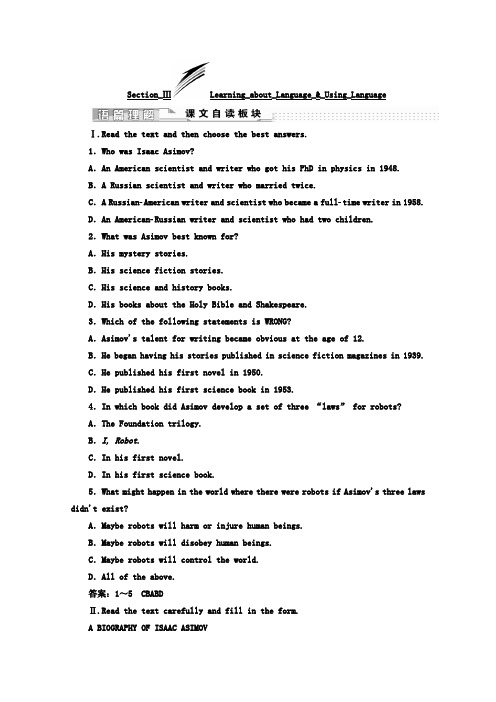
Section_ⅢLearning_about_Language_&_Using_LanguageⅠ.Read the text and then choose the best answers.1.Who was Isaac Asimov?A.An American scientist and writer who got his PhD in physics in 1948.B.A Russian scientist and writer who married twice.C.A Ru ssianAmerican writer and scientist who became a fulltime writer in 1958.D.An AmericanRussian writer and scientist who had two children.2.What was Asimov best known for?A.His mystery stories.B.His science fiction stories.C.His science and history books.D.His books about the Holy Bible and Shakespeare.3.Which of the following statements is WRONG?A.Asimov's talent for writing became obvious at the age of 12.B.He began having his stories published in science fiction magazines in 1939.C.He published his first novel in 1950.D.He published his first science book in 1953.4.In which book did Asimov develop a set of three “laws” for robots?A.The Foundation trilogy.B.I, Robot.C.In his first novel.D.In his first science book.5.What might happen in the world where there were robots if Asimov's three laws didn't exist?A.Maybe robots will harm or injure human beings.B.Maybe robots will disobey human beings.C.Maybe robots will control the world.D.All of the above.答案:1~5 CBABDⅡ.Read the text carefull y and fill in the form.A BIOGRAPHY OF ISAAC ASIMOVBirth and death•born on 2 January, 1920 in Russia•died on 6 April, 1992 in 1.New_YorkWorkBeforeworkingas a writer•worked in his parents' 2.candy store•worked as a(n) 3.junior chemist at the PhiladelphiaNavy Yard•4.taught biochemistry at Boston University School ofMedicineAs a writer•wrote many mystery stories, 5.science_and_historybooks, and books about the Holy Bible and Shakespeare•works of 6.science_fiction:_the Foundation trilogy &I, Robot(一)词义匹配1.digital A.using a system in which information is recorded or sent out electronically in the form of number, usually ones and zeros2.talent B.a feeling of liking and caring about someone or something3.affection C.the story of a person's life written by sb. else4.staff D.the people who work for an organization, especially a school or business 5.biography E.to end your marriage to sb. legally6.divorce F.a natural ability to do sth. well7.bound G.certain or likely to happen, to do or be sth.答案:1~5 AFBDC 6~7 EG(二)根据词性和汉语意思写出单词8.receiver n.收件人;接收机;电话听筒→receive vt.收到9.obey vt.& vi.服从;顺从→disobey vt.& vi.(反义词)不服从;违抗10.imagination n.想象(力);创造力→imagine vt.想象;料想;猜想11.theoretical adj.理论(上)的;假设的→theory n.理论12.assessment n.评价;评定→assess v.评价;评定13.junior adj.较年幼的;资历较浅的;地位较低的n.年少者;晚辈;等级较低者→senior (反义词) adj.资格较老的;地位较高的n.较年长者1.bound[教材原句] Who said that making a robot so much like a man was bound to cause trouble?谁说把机器人造得这么像人一定会引起麻烦?(1)adj.一定的;密切相关的;有义务的;受约束的be/feel bound to do sth.一定会做某事;有义务做某事be bound by sth. 受某事约束be bound up with/in sth.与某事密切相关/忙于某事如果你和同学们相处不好,这肯定会影响你的学习。
2020人教版英语选修7 unit 2 robots period 3 language points
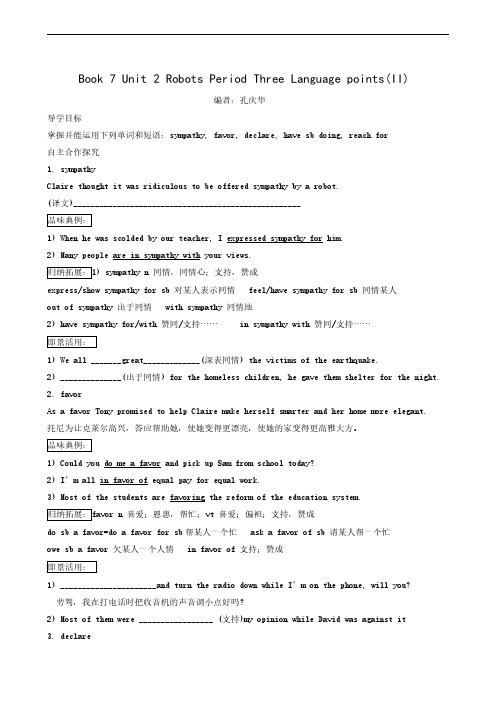
Book7Unit2Robots Period Three Language points(II)编者:孔庆华导学目标掌握并能运用下列单词和短语:sympathy,favor,declare,have sb doing,reach for自主合作探究1.sympathyClaire thought it was ridiculous to be offered sympathy by a robot.(译文)____________________________________________________1)When he was scolded by our teacher,I expressed sympathy for him.2)Many people are in sympathy with your views.sympathy n同情,同情心;支持,赞成express/show sympathy for sb对某人表示同情feel/have sympathy for sb同情某人out of sympathy出于同情with sympathy同情地2)have sympathy for/with赞同/支持……in sympathy with赞同/支持……1)We all_______great_____________(深表同情)the victims of the earthquake.2)______________(出于同情)for the homeless children,he gave them shelter for the night.2.favorAs a favor Tony promised to help Claire make herself smarter and her home more elegant.托尼为让克莱尔高兴,答应帮助她,使她变得更漂亮,使她的家变得更高雅大方。
高二英语选修7unit 2 section 2

out 开出,列出
人教版英语 · 选修7
课前自主预习
要点层级解读
课时演练广场
人教版英语 · 选修7
课前自主预习
要点层级解读
课时演练广场
desire(P10) (1)n.[C,U]渴望;欲望;渴求 ①He has a strong desire to succeed.
=He has a strong desire for success.
have a desire to do sth.渴望做某事
satisfy/meet one’s desire满足某人的愿望
人教版英语 · 选修7
课前自主预习
要点层级解读
课时演练广场
人教版英语 · 选修7
课前自主预习
要点层级解读
课时演练广场
(2)vt.渴望,期望;希望得到;想要(不用于进行时)
③He desired a college education. 他渴望受到大学教育。 ④She desires you to come at once. =She desires that you(should)come at once.
人教版英语 · 选修7
课前自主预习
要点层级解读
课时演练广场
③His success is a great satisfaction to his parents.
他的成功让他的父母很满足。 ④The new dress satisfied her. 那件新衣服令她满意。 ⑤The boss wasn’t satisfied with my work.
comfortable
答案:1.D 2.A 3.E 4.B 5.C
人教版英语 · 选修7
- 1、下载文档前请自行甄别文档内容的完整性,平台不提供额外的编辑、内容补充、找答案等附加服务。
- 2、"仅部分预览"的文档,不可在线预览部分如存在完整性等问题,可反馈申请退款(可完整预览的文档不适用该条件!)。
- 3、如文档侵犯您的权益,请联系客服反馈,我们会尽快为您处理(人工客服工作时间:9:00-18:30)。
2020年精编人教版英语资料Section_ⅢLearning_about_Language_&_Using_LanguageⅠ.Read the text and then choose the best answers.1.Who was Isaac Asimov?A.An American scientist and writer who got his PhD in physics in 1948.B.A Russian scientist and writer who married twice.C.A RussianAmerican writer and scientist who became a fulltime writer in 1958.D.An AmericanRussian writer and scientist who had two children.2.What was Asimov best known for?A.His mystery stories.B.His science fiction stories.C.His science and history books.D.His books about the Holy Bible and Shakespeare.3.Which of the following statements is WRONG?A.Asimov's talent for writing became obvious at the age of 12.B.He began having his stories published in science fiction magazines in 1939.C.He published his first novel in 1950.D.He published his first science book in 1953.4.In which book did Asimov develop a set of three “laws” for robots?A.The Foundation trilogy.B.I, Robot.C.In his first novel.D.In his first science book.5.What might happen in the world where there were robots if Asimov's three laws didn't exist?A.Maybe robots will harm or injure human beings.B.Maybe robots will disobey human beings.C.Maybe robots will control the world.D.All of the above.答案:1~5 CBABDⅡ.Read th e text carefully and fill in the form.A BIOGRAPHY OF ISAAC ASIMOVBirth and death •born on 2 January, 1920 in Russia •died on 6 April, 1992 in1.New_YorkWorkBeforeworkingas a writer•worked in his parents' 2.candy store•worked as a(n) 3.junior chemist at the PhiladelphiaNavy Yard•4.taught biochemistry at Boston University School ofMedicineAs a writer•wrote many mystery stories, 5.science_and_historybooks, and books about the Holy Bible and Shakespeare•works of 6.science_fiction:_the Foundation trilogy &I, Robot(一)词义匹配1.digital A.using a system in which information is recorded or sent out electronically in the form of number, usually ones and zeros2.talent B.a feeling of liking and caring about someone or something3.affection C.the story of a person's life written by sb. else4.staff D.the people who work for an organization, especially a school or business 5.biography E.to end your marriage to sb. legally6.divorce F.a natural ability to do sth. well7.bound G.certain or likely to happen, to do or be sth.答案:1~5 AFBDC 6~7 EG(二)根据词性和汉语意思写出单词8.receiver n.收件人;接收机;电话听筒→receive vt.收到9.obey vt.& vi.服从;顺从→disobey vt.& vi.(反义词)不服从;违抗10.imagination n.想象(力);创造力→imagine vt.想象;料想;猜想11.theoretical adj.理论(上)的;假设的→theory n.理论12.assessment n.评价;评定→assess v.评价;评定13.junior adj.较年幼的;资历较浅的;地位较低的n.年少者;晚辈;等级较低者→senior (反义词) adj.资格较老的;地位较高的n.较年长者1.bound[教材原句] Who said that making a robot so much like a man was bound to cause trouble?谁说把机器人造得这么像人一定会引起麻烦?(1)adj.一定的;密切相关的;有义务的;受约束的be/feel bound to do sth.一定会做某事;有义务做某事be bound by sth. 受某事约束be bound up with/in sth.与某事密切相关/忙于某事①If you can't get on well with your classmates, it's bound to affect your study.如果你和同学们相处不好,这肯定会影响你的学习。
②We are_bound_to_do what we can to help the disabled.我们有义务尽力帮助残疾人。
③Henry's pr oblems are_bound_up_with his mother's death when he was ten.亨利的问题与他10岁时母亲就去世了有关系。
(2)adj.正旅行去……的;准备到……的be bound for some place到某地去④He missed the express train (that/which was) bound for Shanghai.他错过了那辆开往上海的快车。
2.junior[教材原句] In 1942 he joined the staff of the Philadelphia Navy Yard as a junior chemist and worked there for three years.1942年他成为费城海军造船厂的一名初级化学师,并在那里工作了三年。
(1)adj.较年幼的;地位较低的①He held a junior position in the company.他在这家公司担任低级职务。
junior to sb.比某人小;比某人的地位(级别或职位)低②He is three ye ars junior to me.= He is_junior_to me by three years.他比我小三岁。
(2)n.年少者;晚辈;等级、地位较低者③Of the two officers, James is the junior.在两位官员中,詹姆斯是年龄较小的那位。
be ... years one's junior=be one's junior by ... years= be junior to sb. by ... years比某人小……岁④She is four y ears my junior.= She is my junior by four years.= She is junior to me by_four_years.她比我小四岁。
形象记忆[点津] junior, senior, superior等本身含有比较的意味,故没有比较级和最高级;表示比较时,不与than而与to搭配。
⑤Though Jack looks younger than Ann, he's senior to her.虽然杰克看上去比安年轻,但他比她年长。
3.talent n.天才;特殊能力;才干[教材原句] It was when Asimov was eleven years old that his talent for writing became obvious.早在阿西莫夫11岁的时候,他的写作才华就已经显露出来了。
①Writing poems is one of his many talents.写诗是他很多才华中的一个。
(1)have a talent for 对……有天赋;拥有……天赋show a talent for 表现出……才能(2)talented adj. 有才能的;聪颖的My brother showed_a_talent_for music when he was very young.我弟弟在很小的时候就表现出音乐才能。
